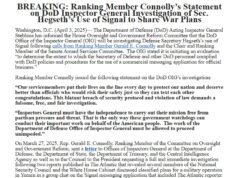Everyone who knows anything about underground coal mining in Appalachia knows that it is extremely dangerous. However, as mining operation have become ever more mechanized – thus requiring far fewer workers to extract the same amount of coal – mine accidents have become less frequent, much of that improvement due to federal and state mining regulations. Those regulations must be enforced in order to protect the workers in those mines.
The recent mine fatalities at Massey Energy Upper Big Branch mine in West Virginia remind us that the danger is still very much there, especially when the mine company ignores safety violations and dangerous situations. Even though Massey is based in Richmond, it has just two operations in Virginia – that is, until its March 2010 merger with Cumberland Resources, a nearly $1 billion deal that gives Massey another 17 Virginia mines.
Perhaps that explains the $441,463 Virginia politicians, mostly Republican, have gotten from Massey since 1997, including $40,000 donated to Republican Gov. Bob McDonnell’s campaign last year.
With the bad record Massey has on safety, I’m sure its top management considers such political contributions its “insurance” against close regulation, sort of “protection money” to keep the cops away. It desperately needs it, considering its lousy safety record.
Simply looking at one Virginia mine, we can see how bad Massey and its CEO Don Blankenship are for the health of its miners. According to the federal Mine Safety and Health Administration (MSHA), the Massey Tiller No. 1 coal mine near Richlands in Tazewell County had the company’s highest injury rate at 9.78 injuries per 200,000 worker hours. (The average rate for all U.S. coal mines is 4.0.)
In 2009 the Virginia Department of Mines Minerals and Energy (DMME) issued 81 violations for the Tazewell mine, while the federal MSHA issued more than 500 violations for the same period. According to the MSHA. that figure is more than 200 percent higher than the national average.
What can be done about Massey’s disregard for mine safety? Probably nothing on the state level. I hardly think that Bob McDonnell or Ken Cuccinelli will do a single thing, except perhaps wink and nod at Don Blankenship at some Republican party fund raiser.
The federal level looks more promising, especially since the Obama administration has replaced the coal industry hacks that the Bush administration put in charge of mine safety, people like J. Steven Griles, a coal industry lobbyist appointed to the second highest position in the Department of the Interior. Bush also appointed coal industry people to head the MSHA. (Talk about putting the fox in charge of the chicken coop.)
The United Mine Workers (UMW) union can’t be of much help. According to Source Watch, of Massey’s almost 7,000 employees, only 87 belong to the UMW, or 1.3%. Heck, Don Blankenship even has an anti-union celebration every Labor Day.
Here’s one problem with present laws: Right now, mine supervisors, foremen and mine companies as a whole can face criminal penalties for serious safety violations. Company presidents or CEOs have no liability because the law assumes that they are not directly involved in causing safety violations. I cannot understand the rationale of that law, especially since Don Blankenship has been quoted – more than once – demanding that mine managers get production rates up or face dismissal, regardless of safety concerns.
Another problem is that ever since the 2006 Sago mining disaster that killed 12 miners, the mining companies have challenged most safety citations they receive. The companies say they do that because fines are much higher and sanctions more serious since the Sago disaster. Plus, mine operators no longer can “negotiate” with mediators to reduce fines and limit sanctions.
I’d like to see mines that have serious safety violations that threaten the lives of employees be given a set time to present a plan for mitigation or face mine closure. I’d also like to see people like Don Blankenship face possible criminal penalties if it can be proven that his actions resulted in the deaths of miners. After all, negligent homicide is defined as criminal negligence that results in the death of another. Telling a mine supervisor to get production up or face loss of a job in a mine with severe safety problems just might be criminal negligence.
Maybe public schools in coal mining areas could begin to teach their children the bloody history of the fight to gain union representation in the coal fields and the reasons that miners were pushed to fight for the right to organize. Ah, but that’s wishful thinking. I know that won’t happen.



 Sign up for the Blue Virginia weekly newsletter
Sign up for the Blue Virginia weekly newsletter








